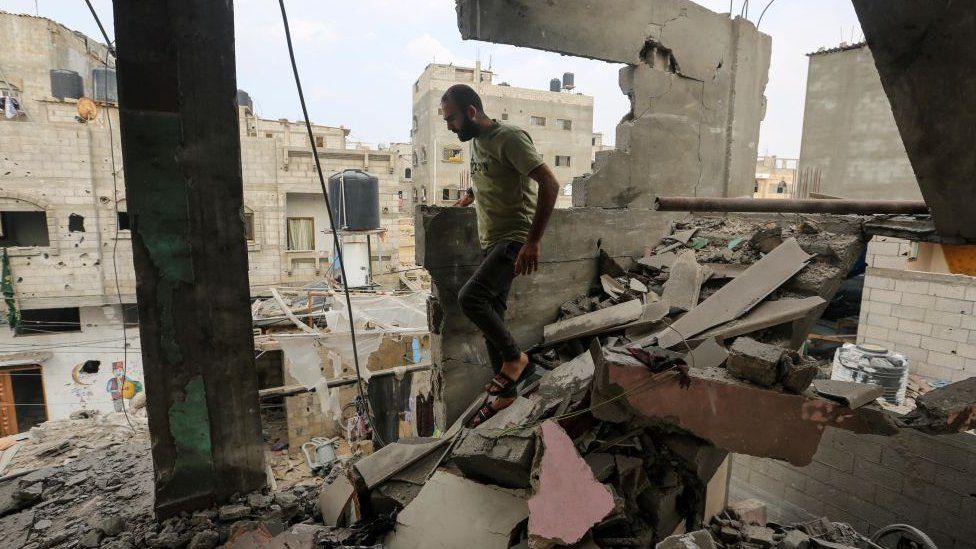18 minutes ago
About sharing
A voice note arrives from a journalist in a city in central Gaza, where lines of communication have been almost completely eliminated.
Mid-way through the audio, a loud explosion thuds in the background.
“The situation is very dangerous,” he says, adding that many people don’t know what happened to their relatives overnight.
The WhatsApp voice note, sent from the city of Deir al-Balah, is one of few insights available into what is happening in Gaza – and how civilians are coping since Israel intensified air strikes and expanded its ground operations on Friday night.
Internet monitoring group NetBlocks says there has been a “collapse in connectivity” in the enclave. The blackout means people can’t contact their friends or family – or even ambulances to pick up the injured.
Most people in Gaza are now unreachable: WhatsApp messages remain on one grey tick, showing they have been sent but not received. Calls go straight to answerphone messages.
In the last communication we had with a professor in Gaza on Friday, he told us he was too scared to follow Israeli evacuation orders and move south, in case his family were caught in a strike on the journey. He has since been unreachable.
But a small number of people in Gaza have foreign SIM cards that can pick up Israeli or Egyptian masts – and the BBC has been able to establish limited contact with several of them.
That includes the journalist in Deir al-Balah, who describes the atmosphere as both tense and confused.
“Some people believe nothing is happening because they are not receiving news updates through messages. They are feeling some comfort,” he says.
“Others are so nervous because they lost [contact with] all their loved ones,” he says.
Further north, in Gaza City, the BBC was able to speak to a different journalist on a short phone call. The man, who asked not to be named, described the bombing overnight as “brutal”.
“We didn’t expect that we would see morning,” he said, adding that heavy bombing had hit “streets, governmental buildings, open fields, the beach”.
The exact scale of injuries and deaths in the past 24 hours is not known. Photos and video footage show mass destruction and residents trying to pull people from the debris.
In one image that is too graphic to show, a man is seen carrying the body of a toddler.
In a separate video posted on Instagram, a badly wounded man is rushed out of a building as crowds shout desperately for an ambulance.
Instead, they put the man into the back of a truck.
More on Israel-Gaza war
Follow live: Latest updates
Explained: What is happening in Israel and Gaza, and why now?
History behind the story: The Israel-Palestinian conflict
Hostages: Who are the hostages taken by Hamas from Israel?
In a patchy voice note, photographer Shebab Younis – who posted the video – described the situation around him as “catastrophic”.
“We have lost contact with people who have been targeted or injured,” he said.
“When there is bombardment of houses, the situation has become really very hard because of the lack of communications and internet services. All this is negatively impacting a large number of medical facilities and public service buildings when there are bombings in their areas.”
Challenged on whether Israel had cut communication in Gaza, Mark Regev, a senior Israeli government advisor, told the BBC it was “standard behaviour to disrupt the communications of your enemy”, likening it to what he said the UK and US had done in previous conflicts.
The United Nations said the blackout had put the civilian population “in grave danger”.
“Ambulances and civil defence teams are no longer able to locate the injured, or the thousands of people estimated to be still under the rubble,” UN High Commissioner for Human Rights Volker Türk said.
“Civilians are no longer able to receive updated information on where they can access humanitarian relief and where they may be in less danger. Many journalists can now no longer report on the situation.”
Palestinian Minister of Communications Ishaq Sider has said efforts are being made to activate international roaming services in Gaza.
But for now, most people there remain, in the words of one of our contacts, “disconnected from the planet”.
Additional reporting by Muath Al Khatib
Related Topics
5 hours ago
11 hours ago
